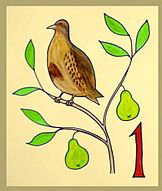Le premier jour de Noël, mon amour m’a donné… une perdrix dans un poirier.
(On the first day of Christmas, my true love gave to me… a partridge in a pear tree.)
Listen to me singing line one, if you dare…(link to MP3 – opens new window)
So many lessons in just this first line!
1. Le premier / la première – because it’s un jour we used the masculine form of “first”, but this word has a feminine form which gets an extra -e and an accent. It would be la première semaine, for example (for “the first week”).
2. Prepositions with dates: Notice that I didn’t use a preposition equivalent of “on [the first day]” (certainly not “sur“, that would mean literally “on top of”). I did use “de [Nöel]” for “of [Christmas]”. If I really wanted to get a preposition in, I could have used au premier jour (à + le => au) but it’s unnecessary. Dates are generally expressed differently in French to English and it’s important to pay attention to the differences. (In fact, we have six different grammar lessons alone concerning days and dates in our French tests, and we will probably add more.)
3. “grand amour” (true love) I’ve seen several attempts at translating “true love” (amour véritable, vrai amour, and worse). You could have amoureux (“lover”, but without the sexual connotations of the English word) but Grand amour is the best translation, and also “l’amour de ma vie” (the love of my life); however, let’s not forget we have to sing this, and the line has to scan. “Amour” will have to suffice!
2. “m’a donné“ This is the verb donner [à] (to give [to]) in le passé composé (conversational past tense formed with avoir + past participle). The best way to understand this part is “[my love to] me has given”.
4. Tense – although it looks a bit similar to the English compound past tense (“he had given”), in French we use le passé composé where we would normally use the simple past or preterite in English (“he gave”). (Another tricky area this: as well as hundreds of conjugation rules we have nine grammar lessons covering when tenses are used in different ways to English, especially past tenses.)
5. Vanishing preposition: “Il a donné un cadeau à moi” (he gave a present to me) becomes “Il m’a donné un cadeau” (note: the à disappeared!). The m’ is short for me (pronounced ‘meuh’) not moi (me + a => m’a), it’s best to think of ‘à moi‘ changing to ‘me‘ and moving place. This simple statement introduces indirect object pronouns which is really quite advanced French grammar! Pronouns are probably the biggest area of French grammar next to verb conjugation in our French test system with almost a hundred French grammar lessons across the CEFR levels!
6. Gender with animals: Notice that it’s une perdrix (a partridge) despite it being un oiseau. Domestic animals in French can be either gender (le chien, la chienne – dog, bitch) but less common animals tend to be male or female irrespective of what their real gender is. The gender of the word doesn’t have to relate to the gender of the animal except for domestic animals where you generally know the gender.
7. Pluralisation: if my true love had given me more than one partridge, the word would stay the same: generally words ending in -s, -x or -z don’t change in the plural form: les perdrix.
8. Le poirier (the pear tree; apple tree would be un pommier) notice this word derives its name from the fruit (la poire) but it’s masculine despite the fruit being feminine. Trees and shrubs tend to be masculine, whereas fruit and veg ending in -e tend to be feminine (but there are exceptions!)
I could go on, but Christmas will be over by the time I get to line two…
More: The 12 Days of Christmas | 2nd Day
